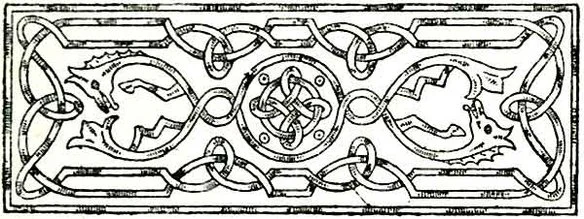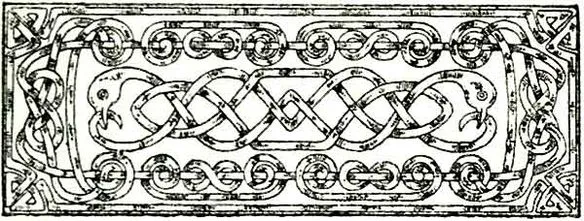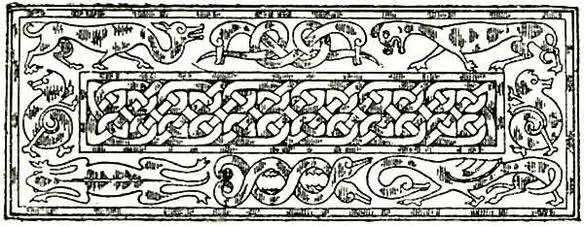Indeed they are far more; for too many among us grow prosaic and commonplace, but she keeps ever a heart full of music. 'I stand here in the doorway,' she said once to me on a fine day, 'and look at the mountain and think of the goodness of God'; and when she talks of the fairies I have noticed a touch of tenderness in her voice. She loves them because they are always young, always making festival, always far off from the old age that is coming upon her and filling her bones with aches, and because, too, they are so like little children.
Do you think the Irish peasant would be so full of poetry if he had not his fairies? Do you think the peasant girls of Donegal, when they are going to service inland, would kneel down as they do and kiss the sea with their lips if both sea and land were not made lovable to them by beautiful legends and wild sad stories? Do you think the old men would take life so cheerily and mutter their proverb, 'The lake is not burdened by its swan, the steed by its bridle, or a man by the soul that is in him,' if the multitude of spirits were not near them?
W. B. Yeats.
Clondalkin,
July 1891.

NOTE

have to thank Lady Wilde for leave to give 'Seanchan the Bard' from her Ancient Legends of Ireland (Ward and Downey), the most poetical and ample collection of Irish folklore yet published; Mr. Standish O'Grady for leave to give 'The Knighting of Cuculain' from that prose epic he has curiously named History of Ireland, Heroic Period; Professor Joyce for his 'Fergus O'Mara and the Air Demons'; and Mr. Douglas Hyde for his unpublished story, 'The Man who never knew Fear.'
I have included no story that has already appeared in my Fairy and Folk Tales of the Irish Peasantry (Camelot Series).
The two volumes make, I believe, a fairly representative collection of Irish folk tales.
LAND AND WATER FAIRIES

THE FAIRIES' DANCING-PLACE
By William Carleton

anty M'Clusky had married a wife, and, of course, it was necessary to have a house in which to keep her. Now, Lanty had taken a bit of a farm, about six acres; but as there was no house on it, he resolved to build one; and that it might be as comfortable as possible, he selected for the site of it one of those beautiful green circles that are supposed to be the play-ground of the fairies. Lanty was warned against this; but as he was a headstrong man, and not much given to fear, he said he would not change such a pleasant situation for his house to oblige all the fairies in Europe. He accordingly proceeded with the building, which he finished off very neatly; and, as it is usual on these occasions to give one's neighbours and friends a house-warming, so, in compliance with this good and pleasant old custom, Lanty having brought home the wife in the course of the day, got a fiddler and a lot of whisky, and gave those who had come to see him a dance in the evening. This was all very well, and the fun and hilarity were proceeding briskly, when a noise was heard after night had set in, like a crushing and straining of ribs and rafters on the top of the house. The folks assembled all listened, and, without doubt, there was nothing heard but crushing, and heaving, and pushing, and groaning, and panting, as if a thousand little men were engaged in pulling down the roof.
'Come,' said a voice which spoke in a tone of command, 'work hard: you know we must have Lanty's house down before midnight.'
This was an unwelcome piece of intelligence to Lanty, who, finding that his enemies were such as he could not cope with, walked out, and addressed them as follows:
'Gintlemen, I humbly ax yer pardon for buildin' on any place belongin' to you; but if you'll have the civilitude to let me alone this night, I'll begin to pull down and remove the house to-morrow morning.'
This was followed by a noise like the clapping of a thousand tiny little hands, and a shout of 'Bravo, Lanty! build half-way between the two White-thorns above the boreen'; and after another hearty little shout of exultation, there was a brisk rushing noise, and they were heard no more.
The story, however, does not end here; for Lanty, when digging the foundation of his new house, found the full of a kam[1] of gold: so that in leaving to the fairies their play-ground, he became a richer man than ever he otherwise would have been, had he never come in contact with them at all.
FOOTNOTES.
[1] Kam—a metal vessel in which the peasantry dip rushlights.

THE RIVAL KEMPERS
By William Carleton

n the north of Ireland there are spinning meetings of unmarried females frequently held at the houses of farmers, called kemps. Every young woman who has got the reputation of being a quick and expert spinner attends where the kemp is to be held, at an hour usually before daylight, and on these occasions she is accompanied by her sweetheart or some male relative, who carries her wheel, and conducts her safely across the fields or along the road, as the case may be. A kemp is, indeed, an animated and joyous scene, and one, besides, which is calculated to promote industry and decent pride. Scarcely anything can be more cheering and agreeable than to hear at a distance, breaking the silence of morning, the light-hearted voices of many girls either in mirth or song, the humming sound of the busy wheels—jarred upon a little, it is true, by the stridulous noise and checkings of the reels, and the voices of the reelers, as they call aloud the checks, together with the name of the girl and the quantity she has spun up to that period; for the contest is generally commenced two or three hours before daybreak. This mirthful spirit is also sustained by the prospect of a dance—with which, by the way, every kemp closes; and when the fair victor is declared, she is to be looked upon as the queen of the meeting, and treated with the necessary respect.
But to our tale. Every one knew Shaun Buie M'Gaveran to be the cleanest, best-conducted boy, and the most industrious too, in the whole parish of Faugh-a-ballagh. Hard was it to find a young fellow who could handle a flail, spade, or reaping-hook in better style, or who could go through his day's work in a more creditable or workmanlike manner. In addition to this, he was a fine, well-built, handsome young man as you could meet in a fair; and so, sign was on it, maybe the pretty girls weren't likely to pull each other's caps about him. Shaun, however, was as prudent as he was good-looking; and although he wanted a wife, yet the sorrow one of him but preferred taking a well-handed, smart girl, who was known to be well-behaved and industrious, like himself. Here, however, was where the puzzle lay on him; for instead of one girl of that kind, there were in the neighbourhood no less than a dozen of them—all equally fit and willing to become his wife, and all equally good-looking. There were two, however, whom he thought a trifle above the rest; but so nicely balanced were Biddy Corrigan and Sally Gorman, that for the life of him he could not make up his mind to decide between them. Each of them had won her kemp; and it was currently said by them who ought to know, that neither of them could over-match the other. No two girls in the parish were better respected, or deserved to be so; and the consequence was, they had every one's good word and good wish. Now it so happened that Shaun had been pulling a cord with each; and as he knew not how to decide between, he thought he would allow them to do that themselves if they could. He accordingly gave out to the neighbours that he would hold a kemp on that day week, and he told Biddy and Sally especially that he had made up his mind to marry whichever of them won the kemp, for he knew right well, as did all the parish, that one of them must. The girls agreed to this very good-humouredly, Biddy telling Sally that she (Sally) would surely win it; and Sally, not to be outdone in civility, telling the same thing to her.
Well, the week was nearly past, there being but two days till that of the kemp, when, about three o'clock, there walks into the house of old Paddy Corrigan a little woman dressed in high-heeled shoes and a short red cloak. There was no one in the house but Biddy at the time, who rose up and placed a chair near the fire, and asked the little red woman to sit down and rest herself. She accordingly did so, and in a short time a lively chat commenced between them.
'So,' said the strange woman, 'there's to be a great kemp in Shaun Buie M'Gaveran's?'
'Indeed there is that, good woman,' replied Biddy, smiling and blushing to back of that again, because she knew her own fate depended on it.
'And,' continued the little woman, 'whoever wins the kemp wins a husband?'
'Ay, so it seems.'
'Well, whoever gets Shaun will be a happy woman, for he's the moral of a good boy.'
'That's nothing but the truth, anyhow,' replied Biddy, sighing, for fear, you may be sure, that she herself might lose him; and indeed a young woman might sigh from many a worse reason. 'But,' said she, changing the subject, 'you appear to be tired, honest woman, an' I think you had better eat a bit, an' take a good drink of buinnhe ramwher (thick milk) to help you on your journey.'
'Thank you kindly, a colleen,' said the woman; 'I'll take a bit, if you plase, hopin', at the same time, that you won't be the poorer of it this day twelve months.'
'Sure,' said the girl, 'you know that what we give from kindness ever an' always leaves a blessing behind it.'
'Yes, acushla, when it is given from kindness.'
She accordingly helped herself to the food that Biddy placed before her, and appeared, after eating, to be very much refreshed.
'Now,' said she, rising up, 'you're a very good girl, an' if you are able to find out my name before Tuesday morning, the kemp-day, I tell you that you'll win it, and gain the husband.'
'Why,' said Biddy, 'I never saw you before.
1 comment